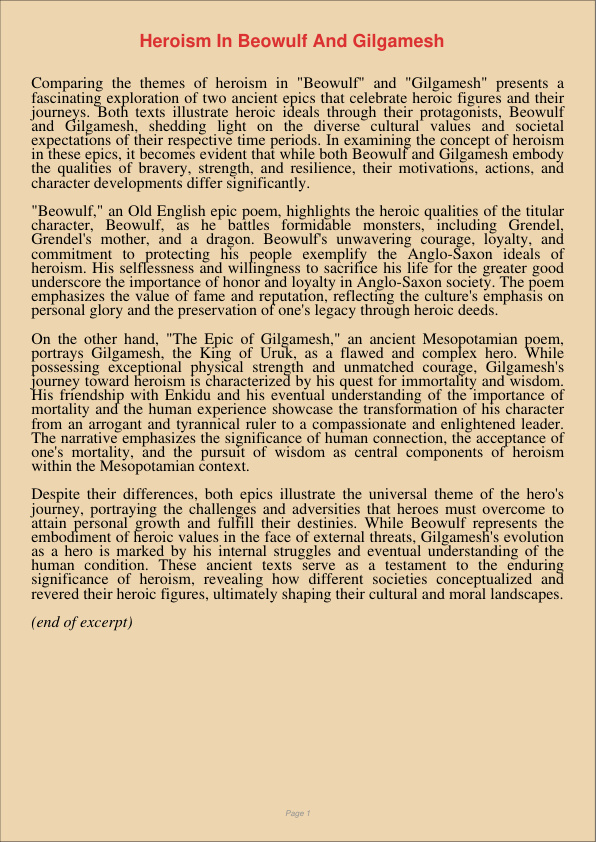Heroism In Beowulf And Gilgamesh
Dec 31, 2023
heroism
gilgamesh
Business
Gender & Sexual Studies
Comparing the themes of heroism in “Beowulf” and “Gilgamesh” presents a fascinating exploration of two ancient epics that celebrate heroic figures and their journeys. Both texts illustrate heroic ideals through their protagonists, Beowulf and Gilgamesh, shedding light on the diverse cultural values and societal expectations of their respective time periods. In examining the concept of heroism in these epics, it becomes evident that while both Beowulf and Gilgamesh embody the qualities of bravery, strength, and resilience, their motivations, actions, and character developments differ significantly.
“Beowulf,” an Old English epic poem, highlights the heroic qualities of the titular character, Beowulf, as he battles formidable monsters, including Grendel, Grendel’s mother, and a dragon. Beowulf’s unwavering courage, loyalty, and commitment to protecting his people exemplify the Anglo-Saxon ideals of heroism. His selflessness and willingness to sacrifice his life for the greater good underscore the importance of honor and loyalty in Anglo-Saxon society. The poem emphasizes the value of fame and reputation, reflecting the culture’s emphasis on personal glory and the preservation of one’s legacy through heroic deeds.
On the other hand, “The Epic of Gilgamesh,” an ancient Mesopotamian poem, portrays Gilgamesh, the King of Uruk, as a flawed and complex hero. While possessing exceptional physical strength and unmatched courage, Gilgamesh’s journey toward heroism is characterized by his quest for immortality and wisdom. His friendship with Enkidu and his eventual understanding of the importance of mortality and the human experience showcase the transformation of his character from an arrogant and tyrannical ruler to a compassionate and enlightened leader. The narrative emphasizes the significance of human connection, the acceptance of one’s mortality, and the pursuit of wisdom as central components of heroism within the Mesopotamian context.
Despite their differences, both epics illustrate the universal theme of the hero’s journey, portraying the challenges and adversities that heroes must overcome to attain personal growth and fulfill their destinies. While Beowulf represents the embodiment of heroic values in the face of external threats, Gilgamesh’s evolution as a hero is marked by his internal struggles and eventual understanding of the human condition. These ancient texts serve as a testament to the enduring significance of heroism, revealing how different societies conceptualized and revered their heroic figures, ultimately shaping their cultural and moral landscapes.
